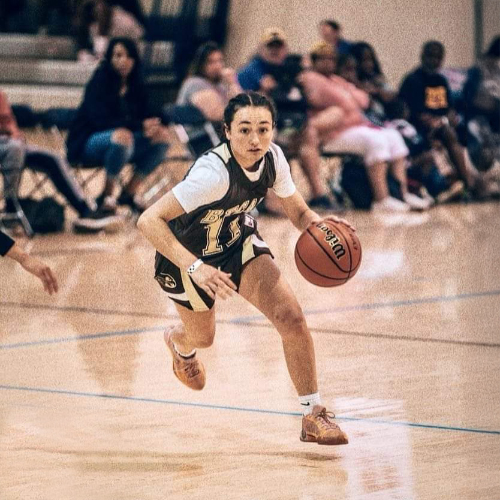Shooting for the Stars

15-year-old Leah is a high-level basketball player at the top of her game as a rising junior on one of Pennsylvania's best high school teams, Bethlehem Catholic High School. At one particularly intense game, as she was running down the court, she felt her heart racing and a tightness in her chest. Her mom, Maria, tried to get Leah to come out of the game, but Leah waved her off and downplayed the symptoms.
Concerned, Maria took Leah to her general pediatrician and explained what had occurred. Her pediatrician immediately referred Leah to a cardiologist and restricted Leah’s activities. Leah’s cardiologist performed numerous tests, including an electrocardiogram (EKG) and echocardiogram, neither of which detected anything abnormal. He gave her a Holter monitor, a small, wearable device that records the heart's rhythm and is used to spot irregularities, to wear for several days. During her next basketball game, Leah wore the monitor at her doctor's insistence. After helping her team to an overtime win, Leah went into cardiac distress in the locker room, experiencing a racing heart, lightheadedness, and chest pain that made it hard to breathe. Her heart rate and pressure were fluctuating wildly.
“We found out later from the Holter monitor data that her heart rate went up to 260 and that she was in atrial fibrillation (AFib) with supraventricular tachycardia (SVT). She could have died,” Maria said. SVT is a fast or erratic heartbeat affecting the heart's upper chambers.
EMTs arrived and took Leah to St. Christopher’s Hospital for Children. At first, the Emergency Department staff was unable to get an accurate reading of her heart, as the AFib episodes were coming and going.
“They said they had to give her medicine to slow her heart so they could get a reading,” Maria recalled. “I was terrified and praying to Jesus, but just before they pushed the meds into the IV, her heart rate dropped to 99 so they could do the reading without it.” The test confirmed that Leah was in AFib.
It is extremely rare for a healthy 15-year-old to have atrial fibrillation, and genetic testing ruled out an inherited condition. Leah was admitted to St. Christopher’s Pediatric Intensive Care Unit (PICU), where the physician started Leah on several medications to slow her heart rate and control her heart rhythm, but the medications did not work.
Leah’s care team told Maria they would have to perform electrical cardioversion, a treatment that uses one or more quick electric shocks to relax her overactive heart. The critical care team shocked Leah’s heart twice but could not get it back into a regular rhythm. However, after a different course of medication, Leah was discharged two days later and cleared to play basketball again.
Leah did not experience any issues for two weeks. Then, another AFib episode struck during basketball practice. She was rushed to a local hospital and taken by air transport to St. Christopher’s PICU, where the Critical Care staff was able to control her symptoms with different medication.
Leah continued to visit St. Christopher’s Heart Center’s outpatient clinic, where she was closely monitored. It eventually became clear that Leah would need ablation therapy. Ablation is a procedure to treat AFib that uses heat or cold energy to create tiny scars in the heart. This helps to break up or insulate the faulty signals that cause irregular heartbeats and can help the heart maintain a normal heart rhythm. A cardiologist commonly uses thin, flexible tubes called catheters to perform an ablation. The catheters are placed in blood vessels and guided to the heart.
The ablation procedure was explained to Leah and her parents, including the fact that an experienced adult electrophysiologist would be on standby during the procedure. Adult and pediatric electrophysiologists sometimes work together to provide the best care for teenagers or young adults.
No other hospital could get an adult and pediatric electrophysiologist in the cardiac catheterization lab at the same time as St. Christopher’s could, which was best for Leah. St. Christopher’s staff also had to figure out how to get them credentialed at the hospital within two weeks.
Maria works in a physician’s office, so she understood the hurdles they faced in having another provider credentialed so quickly to participate in the procedure. “[They] moved mountains to make this happen,” she said.
It proved to be a team effort.
The procedure went well, though there was no guarantee that the AFib would not return. A loop recorder was implanted to monitor Leah's heartbeat for several years.
Maria says Leah’s care was a miracle. “Everyone at St. Christopher’s was just really wonderful and supportive. What we were going through – from the difficulty of diagnosis to getting approval for the adult electrophysiologist to the insurance problem – the St. Christopher’s Heart Center staff were on top of everything.”
Now 16, Leah is doing well and treating her condition with low-dose medication. Division One college basketball scouts are already courting her, so a college scholarship and even higher levels of basketball may be in her future.
